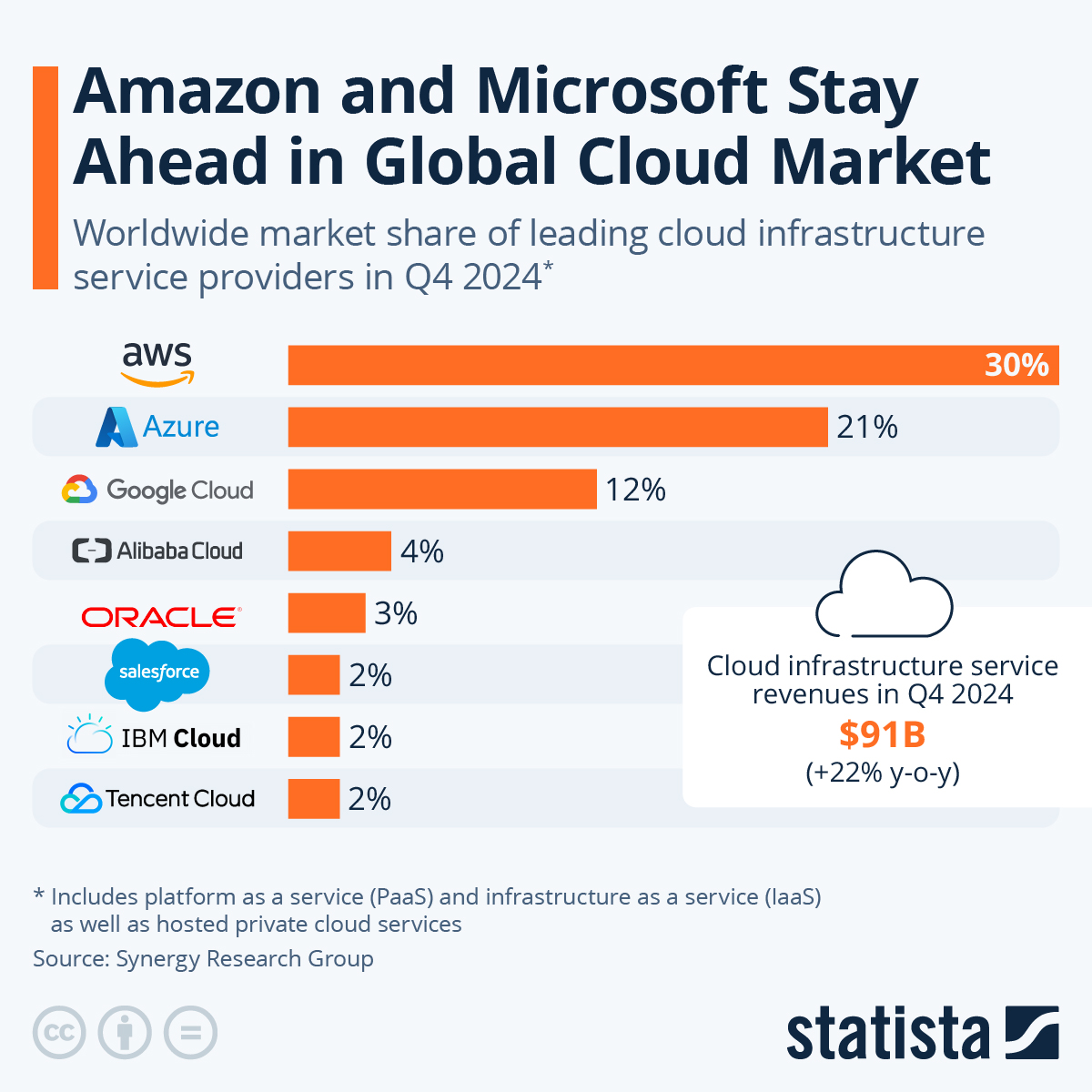|
|
Today’s businesses rely on cloud-based platforms to address their greatest technical challenges. Cloud computing technology grew dramatically during the Covid-19 pandemic. Cloud applications provided companies with new opportunities to grow on a concrete infrastructure during this era.
According to Gartner, businesses adopting cloud-based technology manage in-house, hybrid, or remote workers. They can now build cloud contact centers and have greater scalability and flexibility than in previous years.
The most popular cloud service providers are Amazon Web Services (AWS), Microsoft Azure, Google Cloud Platform (GCP), Oracle Cloud Infrastructure (OCI) and AliCloud.
 You will find more infographics at Statista
You will find more infographics at Statista
If you’re not careful, the hosted services that cloud service providers deliver through the internet can increase cyber threats. These include servers, databases, networks, analytics, software and many other cloud computing tasks.
That said, organizations are adopting cloud computing at an extremely high rate. The good news is that they use private and public clouds. There are 7 amazing facts about cloud computing that businesses need to know, and we will list them below. However, before that, let’s look at what cloud-based technology is all about.
What is Cloud-Based Technology?
Cloud-based technology or cloud computing entails using an interconnected network of servers hosted on the internet to store, manage and process data. In other words, it’s a technology that facilitates data access over the internet instead of a computer hard drive. Cloud computing allows multiple computers to access data over the internet.
So you can use the technology in banking, sharing data, timely management of your reliable omnichannel customer service platforms, and much more. Hosting your database, servers, and software through the internet protects your business in case of a catastrophic hard drive failure or computer breakdown. Indeed, it’s similar to an insurance policy that protects a person against unforeseen events.
Facts about Cloud Computing
1. Increased Storage Capacity
Businesses use contact center omnichannel solutions to engage with customers through multiple channels, including social media, email, phone calls or chats. These interactions generate huge volumes of data which can be a big challenge to store in physical data centers.
Companies integrate their call center omnichannel software with cloud-based platforms to help their agents access customers’ data anytime. Cloud solutions protect your business in case anything happens to your computer. Storing your data in the cloud allows you to access it whenever needed.
The number of cloud service providers keeps growing daily, making access to cloud-based data centers affordable to businesses of all sizes. Indeed this advancement has enabled companies and individuals to enjoy seamless data storage, which is a huge advantage of cloud computing.
AWS offers S3, Azure offers blob and Google offers Cloud Storage.
2. Accessible from Everywhere
Cloud-based technology has helped organizations to have an easy digital transformation journey. Businesses now have the support they need to increase agility, scalability, profitability, and business continuity. Cloud computing technology is the heart of each strategy they develop to attain these goals.
The technology runs cloud-based application software on multiple servers spread across the internet. Businesses can access their files and programs saved on the cloud even in the middle of nowhere as long as they can connect to the internet. Remote workers are using cloud computing applications to work outside the office since they can access data on their mobile devices and computer.
Furthermore, organizations use cloud services to organize files into different categories, share files and grant multiple users access to them. This technology allows you to determine who will access what data and encrypt data in transit.
3. Better Security
Cyber threats are growing in terms of frequency and magnitude every day. At the same time, the cybersecurity industry is leveraging emerging technologies to develop innovative ways to protect your data. Regular releases and updates of anti-malware and firewall tools keep data stored and shared via the cloud securely.
The data saved on cloud servers provided by smaller cloud servers are not entirely safe. Such providers cannot supply all the safeguards necessary for appropriate data protection.
Compared to traditional storage solutions, modern cloud hosting is more secure. Statistics indicate that 94% of businesses that switch to cloud report improved security, while 91% of them found it easy to meet government compliance requirements.
Organizations that use these enhanced data security features offered by the cloud providers have fewer data breaches and losses than those who are hesitant to switch.
4. Automatic Software Updates
For many years, IT professionals regularly updated their infrastructure. But installing these system updates organization-wide takes time and can be irritating. On the other hand, cloud-based applications don’t need manual interventions because they automatically update and refresh themselves.
The automatic software updates save your business money and IT staff time. Today companies need fewer internal IT resources because they can outsource when needed instead of maintaining a large in-house team.
All cloud providers support Platform as a Service (PaaS), Software as a Service (SaaS), and Serverless architecture that avoids the organizations undertaking the traditional software updates.
5. Sustainability
Hosting on the cloud is eco-friendly because of its reduced carbon footprint. Cloud-based technology proactively powers virtual services instead of eliminating the use of physical products and papers. It also improves energy efficiency because workers can access files using their mobile phones.
Cloud computing supports remote work, which reduces commuter-related emissions. As a result, many companies operate cloud contact centers and have recorded improved productivity, customer engagement and reduced overhead costs.
6. Increased Collaboration
Collaboration is the top priority of every company. Cloud computing makes collaboration easy because it enables team members to share and view information saved on a cloud-based platform.
Organizations can now offer omnichannel customer service because some cloud-based services connect employees across the organization through collaborative social spaces. Such services improve engagement and enable the company to provide a seamless digital customer experience.
7. Data Loss Prevention
In the past, companies inseparably tied their valuable data to their office computers. As a result, many data loss cases occurred when the local hardware experienced a problem due to user error, age-related hardware deterioration, viral infections etc.
The increased adoption of cloud-based servers has dramatically reduced the permanent loss of data. Users can access the files they have uploaded to the cloud if they have a computer connected to the internet.
Conclusion
During this digital era, it has become clearer and clearer that to remain competitive, brands must adopt cloud-based solutions. The cloud gives companies more flexibility, reduces costs, increases security, and improves productivity.
Integrating contact center omnichannel software with cloud computing applications improves collaboration, enhances customer experience, and eliminates security concerns due to increased cybersecurity threats.
The 7 factors about cloud-based technology highlighted in this article indicate that the world is moving towards the cloud. Cloud computing continues to gain widespread use even as data generation exponentially increases.
It will be more challenging to save vital information, systems, and programs on physical computer servers. So it’s critical for all organizations to adopt cloud-based technology.
Further Reading: How to start a career in cloud explained in this blog with helpful tips and free resources

